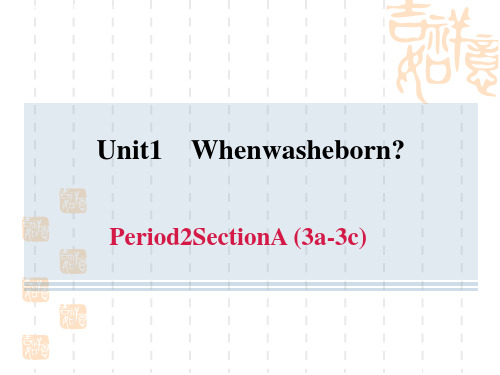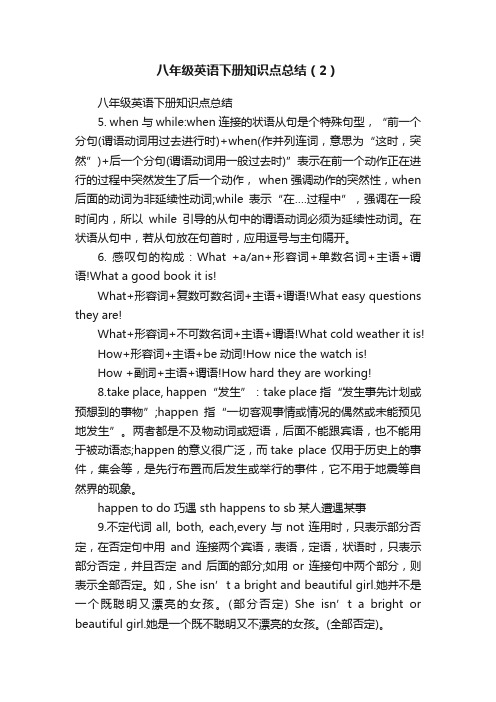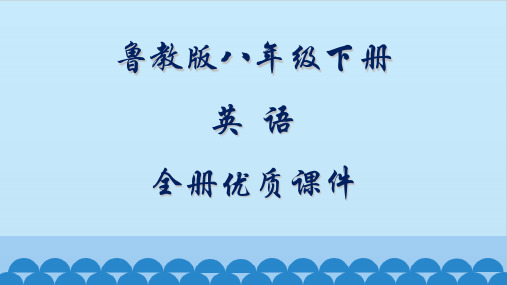鲁教版八年级下英语1-2知识点
八年级下册英语全书语法知识点汇总

八年级下册英语全书语法知识点汇总Unit 1 What’s the matter?一、重点词组1. have a fever / cough / cold 发烧/咳嗽/受凉;感冒2. have a toothache / stomachache 牙疼/胃疼3. have a sore back / throat 背疼/喉咙痛4. talk too much 说得太多5. drink enough water 喝足够的水6. take risks (take a risk) 冒险7. in a difficult situation 在困境中8. give up 放弃9. make a decision 做出决定10. lie down and rest 躺下来休息11. hot tea with honey 加蜂蜜的热茶12. see a dentist 看牙医13. get an X-ray 拍X 光片14. take one’s temperature 量体温15. put some medicine on sth. 在……上面敷药16. feel very hot 感到很热17. sound like 听起来像18. all weekend 整个周末19. in the same way 以同样的方式20. go to a doctor 看医生21. go along 沿着……走22. on the side of the road 在马路边23. shout for help 大声呼救24. without thinking twice 没有多想25. get off 下车26. have a heart problem 有心脏病27. to one’s surprise 使……惊讶的;出乎……意料28. thanks to 多亏了;由于29. in time 及时30. save a life 挽救生命31. get into trouble 造成麻烦(或烦恼)32. right away 立刻;马上33. because of 由于34. get out of 离开;从……出来35. hurt oneself 受伤36. put a bandage on sth. 用绷带包扎37. fall down 摔倒38. feel sick 感到恶心39. have a nosebleed 流鼻血40. cut his knee 割伤他的膝盖41. put her head back 把她的头向后仰42. have problems breathing 呼吸困难43. mountain climbing 登山运动44. be used to doing sth. 习惯做某事45. run out (of) 用完;耗尽46. so that 以便47. so …that 如此……以至于……48. be in control of 掌管;管理49. keep on doing sth. 继续或坚持做某事二、重点句型1. What’s the matter? 怎么了?What’s the matter with you?= What’s the trouble with you?= What’s wrong with you? 你怎么了?2. What should she do? 她该怎么办呢?Should I take my temperature? 我该量一下体温吗?主语+ should/shouldn’t + 动词原形①You should lie down and rest. 你应该躺下休息一会儿。
鲁教版五四制八年级下册英语unit8 Period 1 Section A (1a-2d)

2. Whenautumncomes, lsteaartvtoetsurnyellow.
【点拨】考查leaf。其复数为leaves。句意“秋天 来时, 树叶开始变黄”。
3. Thevillagersgrow___c_o_t_t_o_n (棉花) tomakemoney. 【2021·烟台福山期末】 4. Mybeautifulringismadeof________ (银).
课后巩固 1 chopsticks 6 ismadeof; for
答案呈现
11 Itseemsthat
2 leaves
7 byhand
12 A
3 cotton 4 5 produced
8 Asfaras 9 isfamous
/knownfor 10 widelyused
13 B 14 D 15 A
silver
5. Look! Thenewcaris____p_r_o_d_u_c_e_d(生产) inChina.
【点拨】考查produce。其意思为“生产”。 主语car为动作的承受者, 故用被动语态。
二、根据汉语提示完成句子, 每空一词 6. 奶酪是由牛奶制成的, 所以它对我们的健康有好 处。 Cheese________________________milk, soitisgood_______i_smouardheeoaflth.
________wood, too.
A. of; ofB. from; from
C. of; fromD. from; of
3. 意大利以其丰富的艺术和文化历史而闻名。
【2021·淄博沂源期末】
Italyis________________itsrichhistoryofartandcult
鲁教版五四制八年级下册英语unit1 Period 2 Section A (3a - 3c)

6. Everymorningtheoldpeopleenjoy_____t_h_e_m_s_e_lv_e(sthey) inthesquare, singinganddancing.
7.
so
TheTVplayJoutrhnaetytotheWestis________intere sting________Iwouldliketowatchitagain.
鲁教五四制八年级下
Unit1 Whenwasheborn?
Period2SectionA (3a-3c)
温馨提示:点击 进入讲评
先练后背
答案呈现
1 novel
6 expectedtowin; allovertheworld
2 director 7 droppedoutofschool
3 works
A physicsandchemistry. 【2021·淄博周村月考】 A. BesidesB. BesideC. ExceptD. But
【点拨】词义辨析法。空后名词English与后面所列举 的各个学科都是“我们所学习的科目”, 由此可知, English是在“所学科目之内”, 所以用besides, 故选A。
答案呈现
课后巩固
答案呈现
21 Heisanengineerandisalsohisson'smanager.
22 Foratleastsixhours.
23 我只是想像我的同学一样。那对于我真的很重要。
24 ①becoming ②little ③swim
25 JeffGaye, theYoungAmericanSwimmer
(notpublish) yet,
andIwillsendacopytoyouassoonasit________ (come)
八年级下册英语一到三单元知识点

八年级下册英语一到三单元知识点那咱开始!一单元知识点。
1. 一般将来时。
- 这可是个重要的时态哦!表示将来要发生的动作或存在的状态。
常见的结构有“will + 动词原形”和“be going to + 动词原形”。
比如说,“I will go to Beijing next week.”(我下周要去北京。
)“He is going to have a party tomorrow.”(他明天要开个派对。
)- 要注意哦,will 比较随意,be going to 通常是有计划、有打算的。
2. 短语大集合。
- fall down (摔倒)想象一下,像个大冬瓜“扑通”一下倒地上。
- look for (寻找)别和 find 搞混啦,find 是“找到”,look for 是还在努力找的过程。
- in the future (在未来)未来嘛,充满了神秘和可能!二单元知识点。
1. 情态动词 could。
- could 这个小家伙,语气比 can 更委婉、更客气。
“Could you please help me?”(你能帮帮我吗?)比“Can you please help me?”听起来更有礼貌。
- 还有,could 还能是 can 的过去式,表示过去的能力。
2. 动词短语。
- cheer up (使高兴;使振奋)就像给心情打了一针兴奋剂!- give out (分发;散发)把东西一个一个发出去。
- come up with (想出;提出)脑袋里突然蹦出个好主意。
3. 感叹句。
- What + (a/an) + 形容词 + 名词 + (主语 + 谓语)!“What a beautiful flower!”(多美的花啊!)- How + 形容词/副词 + (主语 + 谓语)!像“How fast he runs!”(他跑得多快啊!)1. 过去进行时。
- 这是在讲过去某个时刻正在进行的动作。
结构是“was/were + 动词的现在分词”。
八年级英语下册知识点总结(2)

八年级英语下册知识点总结(2)八年级英语下册知识点总结5. when 与while:when连接的状语从句是个特殊句型,“前一个分句(谓语动词用过去进行时)+when(作并列连词,意思为“这时,突然”)+后一个分句(谓语动词用一般过去时)”表示在前一个动作正在进行的过程中突然发生了后一个动作, when强调动作的突然性,when 后面的动词为非延续性动词;while表示“在….过程中”,强调在一段时间内,所以while引导的从句中的谓语动词必须为延续性动词。
在状语从句中,若从句放在句首时,应用逗号与主句隔开。
6. 感叹句的构成:What +a/an+形容词+单数名词+主语+谓语!What a good book it is!What+形容词+复数可数名词+主语+谓语!What easy questions they are!What+形容词+不可数名词+主语+谓语!What cold weather it is!How+形容词+主语+be动词!How nice the watch is!How +副词+主语+谓语!How hard they are working!8.take place, happen“发生”:take place指“发生事先计划或预想到的事物”;happen指“一切客观事情或情况的偶然或未能预见地发生”。
两者都是不及物动词或短语,后面不能跟宾语,也不能用于被动语态;happen的意义很广泛,而take place 仅用于历史上的事件,集会等,是先行布置而后发生或举行的事件,它不用于地震等自然界的现象。
happen to do 巧遇 sth happens to sb某人遭遇某事9.不定代词all, both, each,every与not连用时,只表示部分否定,在否定句中用and连接两个宾语,表语,定语,状语时,只表示部分否定,并且否定and后面的部分;如用or连接句中两个部分,则表示全部否定。
鲁教版英语(五四制)八年级下册全册优质课件

Read Part 3 and answer
1. Did little Mo Yan like reading? Yes, he did.
2. Did he have ma源自y books to read? How do you know?
No, he didn’t. 1. At that time, there were only a few books available in his
village; 2. With no more books at hand, he started reading a Chinese
诺贝尔奖包括金质奖章、证书和奖金支票。在遗嘱中他提 出,将部分遗产(920万美元)作为基金,以其利息分设物理、 化学、生理或医学、文学及和平(后添加了经济奖)5个奖项, 授予世界各国在这些领域对人类作出重大贡献的学者。
Do you know of any famous writers?
托尔斯泰
冰心
1. In 1976, he joined the army. During that time, he began to study literature and write stories;
2. In 1981, his first short story was published; 3. In 1987, he became famous when his novel Red Sorghurm was
莫言的作品深受魔幻现实主义影响,写的是发生在山东高 密东北乡的传奇。莫言在他的小说中构造了独特的主观感觉世 界、天马行空般的叙述、陌生化的处理,塑造出神秘的对象世 界,带有明显的“先锋”色彩。
鲁教版英语初二下册知识点
Unit 1 一、词组:1. 体育节目sports shows2. 不介意某事/干某事don’t mind sth / doing sth3. 不能忍受某事/干某事can’t stand sth / doing sth4. 让我们干某事吧let’s do sth让---做---let sb. do5. 更有教育意义more educational6. 弄清,查明find out7. 发生、进行go on8. 世界各地around the world9. 关于…进行一次讨论have a discussion about sth10. 某事发生在某人身上sth happen to sb11. 某人碰巧干了某事sb happen to do sth12. 从…中学到很多learn a lot from…13. 计划干某事plan to do sth14. 期望干某事expect to do sth15. 希望干某事hope to do sth16. 惊悚片scary movies17. 想起,认为think of18. 在美国文化中in America culture19. 有两只大圆耳朵的黑老鼠the black mouse with two large round ears20. 出版,发行come out21. 第一部有声音和音乐的卡通片the first cartoon with sound and music22. 变得become + adj.变得富有和成功become very rich and successful23. 在20世纪30年代in the 1930sin the nineteen thirties24. ---one of + n.pl.+ v.原形主要原因之一one of the main reasons +V三单25. 努力干某事try to do sth26. 面对任何危险face any danger27. 例如干某事such as +n./ doing28. 愿意,准备好干某事be ready to do sth29. 竭力干某事try / do one’s best to do sth.30. 看到某人干某事see the little man winsee sb do31. 第一个拥有一颗星星的卡通角色the first cartoon character to have a star32. 不如…not as/so…(原级)…as33. 一对耳朵 a pair of ears34. 打扮地像一个男孩dress up like a boydress 三单dresses35. 代替某人干某事take sb’s place to do sth.36. 扮演…角色好play one’s role well37. 干得好do a good job38. 令人愉快的东西something enjoyable39. 超过over ==more than40. 一个普通人 a common man41. 更出名more famous二、句子:你想要看新闻吗?是的,我想。
鲁教版英语八年级下册单词-默写表
担心;关心 v.成功 n.成功 n. 要点;论点;v.指点
Unit 5
v.更喜爱;更喜欢 相对于B来说,更喜欢A(喜欢A,不喜欢B) n.(常pl.)歌词;抒情词句 adj.轻柔的;柔和的 v.不喜欢 提醒;使记起 n.心;内心 n.细绳;线 v.下沉;沉没 黄河 n.(pl.fishermen)渔民;渔夫 adj.最近的 n.娱乐;乐趣;快乐 n.特点;特征 n.摄影;照相 n.美术馆;画廊 n.摄影者;摄影师 v.&n.显示;陈列;展览 展览;陈列 n.照片;相片 v.引起...感兴趣;n.兴趣 n.等级;类别 pron.不管什么;无论什么 v.错过;遗漏;想念;小姐 v.建议;提议;暗示;间接表明 n.活力;力量;能量 adj.(=OK) 好的 n.(常pl.)赞成的观点 n.(常pl.)反对的观点 adj.诚实的;真诚的 n.课程 v.适合;使感到满意;一套(衣服) (很)合某人的意;对某人(很)合适 v.期待;预料 adj.甜的 v.品尝;尝起来
n.黄昏;黑暗 n.白天;日间 v.醒来;唤醒 睡醒;醒来 n.狐狸 n.大自然;自然界 adj.自然的;自然界的 n.环境 n.温度 一年到头;终年 n.赤道 conj.无论如何 n.春天;喷泉 喷泉 n.秋天 n.季节 n.类型;v.打字 vt.影响 adj.醒着的
Unit 2
n.抽认卡中文 n.&v. 闪光 n.词汇 adv.出声地, 大声地 v.发……音 n.发音, 发音法 adj.明确的, 具体的; 特定的 n.记忆,记忆力,存储器 v.记住, 熟记 n. 语法;语法规则 adv.不同地;有区别地 adj.困难的 v.使失望;使沮丧;使厌烦 adj. 令人失望的;令人沮丧的 adv. 快地;迅速地 v. 补充;继续说;加 a.激动的 根本不;全然不 结束,告终;竖着 adj.口语的;口头的 adv. 慢地;缓慢地 n. 错误;过失
鲁教版八年级下英语第一单元知识梳理总结
鲁教版八年级下英语Unit 1 When was he born?单元总结思维导图【Section A】知识点一:be born的用法教材原文——When was she born?—She was born in 1996.-她是什么时候出生的? 她是1996年出生的。
be born意为“出生”,是被动语态结构,常用作固定短语,其中动词be通常只用was或were。
如:Tom was born in Hebei Province on February12,1999.汤姆1999年2月12日在河北省出生。
The two boys were born on the same day.这两个男孩在同一天出生。
例1(2018辽宁辽阳中考)彼得天生具有音乐才能。
Peter______ ______ ______ the talent of music。
【答案】was born with【解析】观察所给句子可知,填空部分意为“天生具有”,应用短语be born with来表示,且主语为第三人称单数,故be动词用一般过去时形式was。
知识点二:时间介词小结教材原文:He was born into a farmer's family in Gaomi Shandong,in February 1955. 他于1955年2月出生于山东高密的一个农民之家。
常用于表示时间的介词有:at,on,in。
其用法如下:in用在月份、季节、年份、世纪等之前,或用于上午、下午或晚上之前以及某些固搭配中。
如:in May、in spring、in the 1990s、in the morning、in the daytime等at用在具体的时刻之前,也可用在某些固定搭配中。
如:at half past six、at noon、at night、at the end of等时间介词。
on用在具体的某一天(生日、节日、星期)之前或某一天的上午、下午或晚上前。
鲁教版八年级下册英语知识点
Unit 1 Have you ever been to an amusement park?⼀..重点难点释义1. Me neither=Neither have I . 我也没去过。
(1)英语中表⽰后者与前者情形相同,“也不……”时,常⽤neither引起的倒装句Neither+助动词/系动词be/情态动词+主语。
eg:--I'm not tall. Neither is she. =She's not tall, either. 我个⼦不⾼,她个⼦也不⾼。
--They can't cook. Neither can we. =We can't cook, either. 他们不会做饭,我们也不会。
(2)如果表⽰后者与前者情形相同,“也……”常⽤so引起的倒装句, so+助动词/系动词be/情态动词+主语。
eg:--My friends are happy. So am I.=I'm happy, too./I'm also happy. --They will leave by air. So will you. =You will also leave by air. 2 hear, hear of, hear from*hear 为动词,有听见和听说之意。
作“听见”解,只强调结果。
作为:“听说”解,其后⼀般跟从句。
**hear of 听说,听到,其后跟名词或从句。
--My grandma can't hear very well. --I hear that they miss us very much. --I heard him singing in the next room. --Have you ever heard of Edison? 3. be famous for ,be famous as与be famous to**be famous for 因为……⽽出名/,for后接表⽰特点、特长的名词,表⽰⼈或物闻名的原因 --The village is famous for its green tea.**be famous as 以……⾝份出名,as后⼀般接表⽰职业的名词。
- 1、下载文档前请自行甄别文档内容的完整性,平台不提供额外的编辑、内容补充、找答案等附加服务。
- 2、"仅部分预览"的文档,不可在线预览部分如存在完整性等问题,可反馈申请退款(可完整预览的文档不适用该条件!)。
- 3、如文档侵犯您的权益,请联系客服反馈,我们会尽快为您处理(人工客服工作时间:9:00-18:30)。
Unit 1 Have you ever been to an amusement park?一..重点难点释义1. Me neither=Neither have I . 我也没去过。
(1)英语中表示后者与前者情形相同,“也不……”时,常用neither引起的倒装句Neither+助动词/系动词be/情态动词+主语。
eg:--I'm not tall. Neither is she. =She's not tall, either. 我个子不高,她个子也不高。
--They can't cook. Neither can we. =We can't cook, either. 他们不会做饭,我们也不会。
(2)如果表示后者与前者情形相同,“也……”常用so引起的倒装句,so+助动词/系动词be/情态动词+主语。
eg:--My friends are happy. So am I.=I'm happy, too./I'm also happy.--They will leave by air. So will you. =You will also leave by air.2 hear, hear of, hear from*hear 为动词,有听见和听说之意。
作“听见”解,只强调结果。
作为:“听说”解,其后一般跟从句。
**hear of 听说,听到,其后跟名词或从句。
--My grandma can't hear very well. --I hear that they miss us very much.--I heard him singing in the next room. --Have you ever heard of Edison?3. be famous for ,be famous as与be famous to**be famous for 因为……而出名/著名,for后接表示特点、特长的名词,表示人或物闻名的原因--The village is famous for its green tea.**be famous as 以……身份出名,as后一般接表示职业的名词。
--HanHong is famous as a pop singer.韩红以流行歌曲而闻名。
**be famous to 对某人来说是著名的,to后常接人。
--The pop singer is famous to the young people.4 different 不同的。
其名词是difference。
be different from …与。
不同:--My ideas is different from yours.我的观点与你的不一样。
5.around作为介词,“在……周围,到处,大约eg:--I traveled around the world.我周游了世界。
-It's around/about ten o'clock.大约有10点了。
5.mean 表示“意味着”用来表示人的言论或行为,某一标志或词语的意思所指。
eg:--What do you mean? 你的话是什么意思。
-What does this word mean? =What's the meaning of this word?这个词是什么意思?6. have problems (in) doing “做谋事很费劲”。
in在句中可省略,后面接动词+ing形式。
problem是可数名词,在句型中作“困难、麻烦”解,这里problems还可以用difficulty或trouble代替,但这两个词在句型中作不可数名词用。
eg:--We had some problems getting to the top of mountain.7. seem “好像、似乎”,其后加形容次。
eg:--He seems unhappy today.他今天好像不高兴。
1)seem to do something.eg:--He seems to be happy. 他好像很高兴--My mother seemed to know that. 我妈妈好像知道那件事。
4)It seem that +eg:--It seems that he is happy.=He seems (to be) happy 他好像很快乐8. have been a/an+n. 成为一个……Jim has been a soldier for 3 years.9. all the time始终,一直。
例如:She is later for work all the time no matter where she works.10. take different routes走不同的路线route n.路;路线。
例如:We came by a longer route than usual.我们走了一条比通常要长的路来的。
11.has been to…表示“去过某地”,可以和once, twice, never, ever等词连用。
——Where have you been? 你去哪里了?——I have been to the library.12. have/ has gone to…“去了某地”,指说话时某人已离开此地,在去某地的路上或已到达某地,因此这个句型通常用第三人称作主语,不能与once, twice never等连用。
—Where is Jim?—He has gone to the library. (去图书馆了)13. awake: adj. 醒着的;wake: v. 醒,叫醒……wake up14. whenever 无论何时Whenever we see him, we speak to him.15. almost: 几乎,差不多Almost all of us have seen the film16. temperature 温度take one’s temperature 量体温17. dark “黄昏,黑暗”,是名词,也可用作形容词。
It’s getting darker and darker.dark 也可指“深色的”。
dark blue/ green18. population:名词“人口”W hat’s the population of China?The population of China is larger than that of Japan.19. a quarter “一刻钟,1/4”,three quarters 3/4,相当于three fourths.△分数的表达法:分子用基数词,分母用序数词,若分子大于1时,分母的序数词要用复数形式。
例如:1/3:one third, 或a third 2/5:two fifths 6/7:six sevenths 1/2:one half或a half 注意:“某整体的几分之几”作主语时,谓语动词应与分数所修饰的名词一致。
例如:1)Three fourths of the water is by me. 3)One half of the students are on the playground.20. around the world 遍及全世界”,相当于all over the world或者across the world.21. more than表示“超过,多于”,相当于over22. *It’s fun to do sth.fun为不可数名词,表示“乐事,有趣的事”。
It’s fun to fly kites here二.短语1. 太空博物院space museum2. 游乐场amusement park3. 水上乐园water park 6. 呆在某个地方have been in7. 既不也不;两者都不neither …nor …9. 迪斯尼人物Disney character 10. 主题公园 a theme park11. 当然of course 12. 过山车 a roller coaster13. 以┉…为主题be themed by 14. 四处走动walk around16. 迪斯尼巡游Disney Cruise 17. 兜风take a ride18. 在船上on board 21. 空中乘务员 a flight attendant22. 导游 a tour guide 23. 象……这样的such as24. 考虑think about 25. 胜于,而不是rather than26. 在东南亚in Southeast Asia 27. 度假take a holiday28. 在一方面on the one hand 29. 在另一方面on the other hand33. 做某事有困难have some problem (in)doing38. 全年all year round34. 不管还是;whether or 35. 夜狩night safari36. 在白天during the daytime 37. 在更自然的环境里in a more natural environment 39. 靠近be close toUnit 2一、知识点1.Check in : 在旅馆的登记入住。
Check out: 在旅馆结账离开。
2.By: ①通过…..方式(途径)。
例:I learn English by listening to tapes.②在…..旁边。
例:by the window/the door ③乘坐交通工具例:by bus/car④在……之前,到……为止。
例:by October在10月前⑤被例:English is spoken by many people.3.how与what的区别:how通常对方式或程度提问,:怎么样如何,what通常对动作的发出者或接受者提问:什么,②How is your summer holiday? It’s OK.②How did you travel around the world? I travel by air.③What do you learn at school? I learn English, math and many other subjects.④ What…think of…? How…like…? ③What…like about…? How…like…?④What’s the weather like today? How’s the weather today?⑤What to do? How to do it?e.g. What do you think of this book?=How do you like this book?What do you like about China?=How do you like China?I don’t know what to do next step?=I don’t know how to do it next step?㊣What good / bad weather it is today!=how good the wearher is㊣What a fine / bad day it is today!=how fine the day is4. aloud, loud与loudly的用法: 三个词都与"大声"或"响亮"有关。
